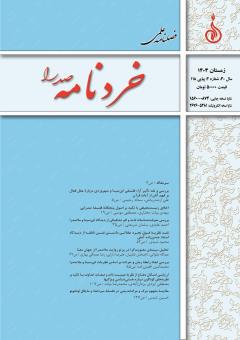مقایسه مفهوم مرگ و مرگاندیشی در فلسفۀ میرداماد و مایگل اونامونو
محورهای موضوعی : Studies on Mulla Sadra and the Transcendent Philosophy
1 - استادیار گروه علوم تربیتی، دانشگاه فرهنگیان، تهران، ایران
کلید واژه: فلسفه, عرفان, مرگ, مرگاندیشی, اونامونو, میرداماد,
چکیده مقاله :
مرگاندیشی، پابپای وجوداندیشی، در تمام ساحتهای اندیشه حاضر است. ببیان دیگر، مرگ یکی از کهنترین مسائل فلسفی و عرفانی است که حکیمان و متفکران بسیاری دربارۀ آن بحث کرده و هریک بر اساس مبانی فکری و افق اندیشۀ خویش، در اینیاره سخن گفتهاند. این پژوهش به بررسی و مقایسۀ مفهوم مرگ و مرگاندیشی در فلسفۀ دو اندیشمند بزرگ، مایگل اونامونو و میرداماد میپردازد. بدیهی است ایندو که هر یک نظام فلسفی و مکتب فکری ویژهیی دارند، در اینباره نیز دیدگاههایی خاص داشته باشند. این پژوهش از نوع تحلیلیـمقایسهیی است که با استفاده از منابع کتابخانهیی و با استناد به منابع پژوهشی مکتوب انجام گرفته است. این جستار میکوشد به این پرسش اصلی پاسخ دهد که مفهوم مرگ و مرگاندیشی در فلسفۀ دو فیلسوف مذکور چه معنایی دارد؟ یافتههای پژوهش نشان میدهد با توجه به مفهوم مرگ و زندگی، زهدمحوري در تفکر فلسفی و عرفانی هر دو فیلسوف جایگاهی خاص دارد و مسئلۀ مرگ در تفکر هر دو، مسئلهیی متافیزیکی و هستیشناسانه است. بنظر میرسد هر دو فیلسوف معتقدند ترس از مرگ، مسئلهیی فطری است که همۀ موجودات زنده را میآزارد، اما این ترس با آگاهی انسان از هستی و روش کار طبیعت، تعدیل میشود. بر این اساس، هر دو فیلسوف نهتنها مرگ را پدیدهیی صرفاً نابودگر تلقی نمیکنند، بلکه بعنوان یک امر ایجابی به آن مینگرند.
Thanatopsis has always been discussed alongside thinking about existence in different fields of philosophy. In other words, death is one of the oldest philosophical and gnostic problems that has been discussed by several philosophers and thinkers, each approaching it based on their own philosophical principles. This study has examined and compared the concept of death and thanatopsis in the philosophies of two prominent thinkers, Miguel de Unamuno and Mīr Dāmād. Evidently, each of them has a particular view in this regard based on his own specific philosophical system and school of thought. This analytic-comparative study has been carried out relying on library and research resources. Here, the author tries to respond to the question of what the meaning of death and thanatopsis in the philosophies of these two philosophers is. The findings indicate that, given the concepts of death and life, piety plays a central role in the philosophical and gnostic thoughts of both thinkers, and death is a metaphysical and ontological problem in their philosophies. Apparently, both of them believe that fear of death is an intrinsic problem that bothers all living things; nevertheless, this fear is moderated by man’s awareness of being and nature’s method of work. Accordingly, instead of viewing death as a purely destructive phenomenon, both of them consider it to be an affirmative affair.
